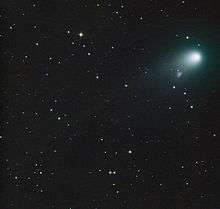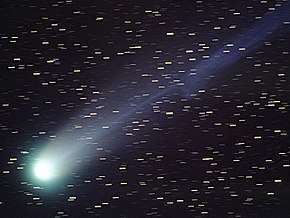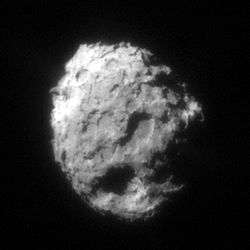168P/Hergenrother
168P/Hergenrother is a periodic comet in the Solar System. The comet originally named P/1998 W2 returned in 2005 and got the temporary name P/2005 N2.[4] The comet was last observed in February 2013,[1] and may have continued fragmenting after the 2012 outburst.
 168P/Hergenrother during its 2012 outburst. By Mount Lemmon Observatory. | |
| Discovery | |
|---|---|
| Discovered by | Carl W. Hergenrother |
| Discovery date | November 22, 1998 |
| Alternative designations | P/1998 W2 P/2005 N2 |
| Orbital characteristics A | |
| Epoch | March 6, 2006 |
| Aphelion | 5.839 AU |
| Perihelion | 1.426 AU |
| Semi-major axis | 3.632 AU |
| Eccentricity | 0.6075 |
| Orbital period | 6.923 a |
| Inclination | 21.8934° |
| Earth MOID | 0.4 AU (60 million km) |
| Last perihelion | August 5, 2019[1][2] (Not recovered) October 1, 2012[3] November 2, 2005 |
| Next perihelion | 2026-May-18[1] |
2012 outburst
The comet came to perihelion on 1 October 2012,[3] and was expected to reach about apparent magnitude 15.2, but due to an outburst the comet reached apparent magnitude 8.[5] As a result of the outburst of gas and dust, the comet was briefly more than 500 times brighter than it would have been without the outburst.[6] On 19 October 2012, images by the Virtual Telescope Project showed a dust cloud trailing the nucleus.[7] Images by the 2 m (79 in) Faulkes Telescope North on 26 October 2012 confirm a fragmentation event.[8] The secondary fragment was about magnitude 17. Further observations by the 8.1 m (320 in) Gemini telescope show that the comet fragmented into at least four parts.[9]
2019
168P came to perihelion around August 5, 2019,[1] when it was expected to be 76 degrees from the Sun. 168P has not yet been recovered and may have disintegrated. During this perihelion passage 168P will make a closest approach to Earth in early November 2019 when it will be 1 AU (150 million km) from Earth with a solar elongation of about 110 degrees.
References
- "168P/Hergenrother Orbit". Minor Planet Center. Retrieved 2014-06-20.
- Syuichi Nakano (2012-07-17). "168P/Hergenrother (NK 2283)". OAA Computing and Minor Planet Sections. Retrieved 2012-10-13.
- Syuichi Nakano (2009-04-23). "168P/Hergenrother (NK 1778)". OAA Computing and Minor Planet Sections. Retrieved 2012-02-20.
- IAUC 8560: recovery of comet P/1998 W2
- Seiichi Yoshida (2012-02-21). "168P/Hergenrother (2012)". Seiichi Yoshida's Comet Catalog. Retrieved 2012-02-25.
- Math:
- Gianluca Masi (October 19, 2012). "Comet 168P/Hergenrother: hi-res images (19 Oct. 2012)". Virtual Telescope Project. Retrieved 2016-10-18.
- Giovanni Sostero; Nick Howes; Ernesto Guido (October 26, 2012). "Splitting event in comet 168P/Hergenrother". Remanzacco Observatory in Italy – Comets & Neo. Retrieved 2012-10-28.
- Phil Plait (2012-11-05). "Breaking up is easy to do. If you're a comet". Bad Astronomy. Retrieved 2012-11-05.
External links
- Orbital simulation from JPL (Java) / Horizons Ephemeris
- 168P on Seiichi Yoshida's comet list
- Elements and Ephemeris for 168P/Hergenrother – Minor Planet Center
- 168P at Kronk's Cometography
- Comet 168P Hergenrother in outburst (Google+ chat archive Oct 12, 2012)
- Comet Hergenrother in Outburst (Carl Hergenrother : 20 Oct 2012)
- Comet 168P and fragment as seen by Kitt Peak WIYN 3.5-metre (140 in) on 30 Oct 2012
- Scientists Monitor Comet Breakup (168P-Hergenrother was imaged by the NOAO/Gemini telescope Nov. 2, 2012)
- Temporal Correlation Between Outbursts and Fragmentation Events of Comet 168P/Hergenrother (arXiv:1409.7641 : 26 Sep 2014)
| Numbered comets | ||
|---|---|---|
| Previous 167P/CINEOS |
168P/Hergenrother | Next 169P/NEAT |




